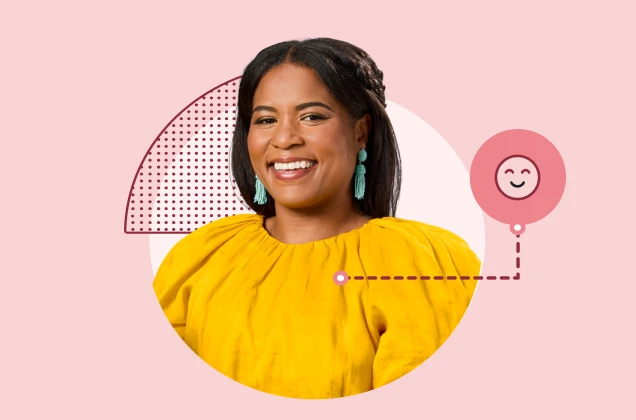What is brand loyalty? How to build a loyal customer base
What is brand loyalty?
Brand loyalty is when a customer prefers your brand over your competitors. A loyal customer isn’t interested in trying out your competitors’ options because they already feel that your product totally meets their needs. They’ll make repeat purchases, buy from your brand regardless of the convenience or price of your products, and recommend your products to others. All of this drives your business and boosts your bottom line.
Let’s dig into how to build and maintain brand loyalty, how to use surveys to find out what customers want from your brand, and what you can learn from some brand loyalty examples.
Look into your brand loyalty with expert help
Get started with our enhanced market research services.
Why brand loyalty is important
Brand loyalty has a huge effect on your business’s revenue and profit. Loyal customers typically spend more than other customers, especially over the course of their entire customer lifespan. Loyal customers are also less price-conscious than other customers, so it’s easier to retain them if your prices increase or a cheaper alternative hits the market.
Consider Apple, a widely-cited example of brand loyalty. Over the years, the company has amassed a devoted customer base; 90.5% of current iPhone owners plan to stay loyal to Apple the next time they upgrade, despite the fact that newer models typically have higher price tags and cheaper alternatives are readily available.
Loyal customers are more likely to try new products from your brand, which makes it easier to launch new products successfully. Because 3 in 5 people say they’d rather purchase a new product from a familiar brand than from a brand they don’t know, loyal customers are often your most enthusiastic early adopters. This demonstrates how brand loyalty is a critical component of brand equity, or the extra value that a business gets from a product with a recognizable name compared to the generic alternative. When more people are loyal to your brand, you can leverage your brand equity to raise your prices and expand your product line.
How to track brand loyalty with surveys
A brand loyalty survey helps you understand the opinions and habits of the loyal customers who advocate for your brand. To build brand loyalty for long term success and track shifting brand loyalty, stay in communication with your audience. Ask for periodic feedback by surveying your customers and target market 2 to 4 times per year.
Here are a few great ways to measure brand loyalty over time:
- Gauge your customer satisfaction. In your brand loyalty survey, ask customers specific questions about your brand’s products, prices, and convenience to find out what keeps your customers coming back (or what’s keeping them from making another purchase).
- Calculate your Net Promoter® Score (NPS). Your NPS is the percentage of people who would recommend your brand (your promoters), minus the percentage of people who would not recommend your brand (your detractors). It’s an excellent way to determine brand loyalty, as it indicates the likelihood of both repurchase and referral.
- Let the customer speak. While quantitative data like NPS is useful, the most actionable insights often come from open-ended survey questions. Feedback from these questions give you the qualitative data you need to make targeted improvements to your brand.
Two in three senior marketing managers find the “brand loyalty” metric very useful in their work. The results of a brand loyalty survey tell you what your loyal customers like about your brand, which helps you position and develop the brand over time. By using SurveyMonkey Audience, marketers can also learn why people are loyal to competitors instead of their brands.
Ready to start building and measuring brand loyalty? Get started with our brand loyalty survey template.
3 ways to build brand loyalty
While the path to brand loyalty is different for each brand (look to your survey results for guidance), here are a few strategies to increase brand loyalty:
- Provide an excellent customer experience. A brand’s customer service plays a big part in whether or not it earns a customer’s loyalty. Since 1 in 3 consumers say they would walk away from a brand they love after just one bad experience, it’s important to focus on every step of the customer journey, from social media to customer support. When you can give your audience an experience they can’t get anywhere else, they’ll always come back to your brand for more.
- Build a community for your customers. A customer meetup or a social media hashtag can promote feelings of loyalty, trust, and belonging in your customers. GoPro, for example, turns user-generated content into powerful marketing material with its social media campaigns. These campaigns provide social proof for new audiences and bring loyal customers closer together as they become united under one hashtag.
- Encourage repeat purchases with a rewards program. Most loyal customers will join a rewards program if you ask them. These programs help lock in your most profitable customers by providing extra perks and incentives to continue their relationship with your brand. Brand rivals Coca-Cola and Pepsi, for example, keep their passionate customer bases polarized with rewards programs like My Coke Rewards and Pepsi Stuff. The Starbucks loyalty program, a.k.a. Starbucks Rewards, has around 17 million members in the U.S. and 10 million members in China, making it one of the most popular loyalty programs in the restaurant industry.
How loyal are your customers?
Find out with our brand loyalty survey template.
Hitta fler resurser

Ansvarig inom varumärkesmarknadsföring
Varumärkesansvariga kan använda det här verktygskitet för att förstå målgruppen, få varumärket att växa och förbättra avkastningen.

Se SurveyMonkeys lösningar för konsumentprodukter och -tjänster
Produkter och tjänster för konsumenter – inklusive snabbrörliga konsumentvaror, resor och hotell – förlitar sig på SurveyMonkey-insikter.

Utforska SurveyMonkeys lösningar för detaljhandeln
Ta reda på hur SurveyMonkey hjälper företag att hitta rätt bland nya marknadstrender, utveckla framgångsrika produkter och skapa omtyckta varumärken.

Se SurveyMonkeys lösningar för bolag inom professionella tjänster
Se hur organisationer inom professionella tjänster använder SurveyMonkey för att få insikter om kunder och marknader.